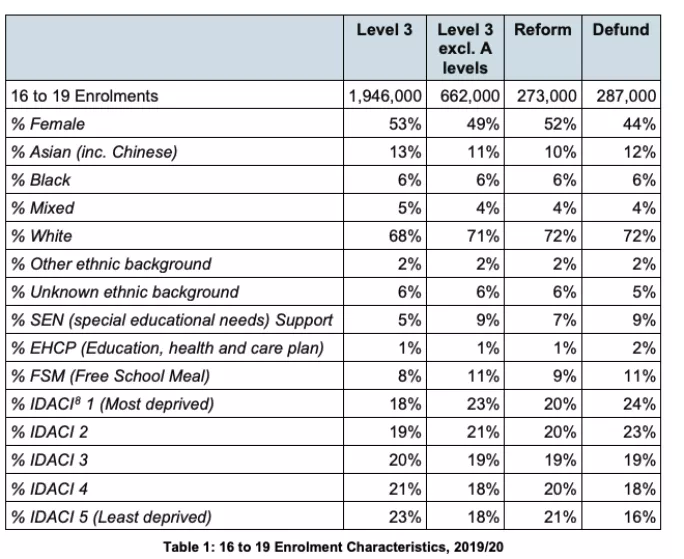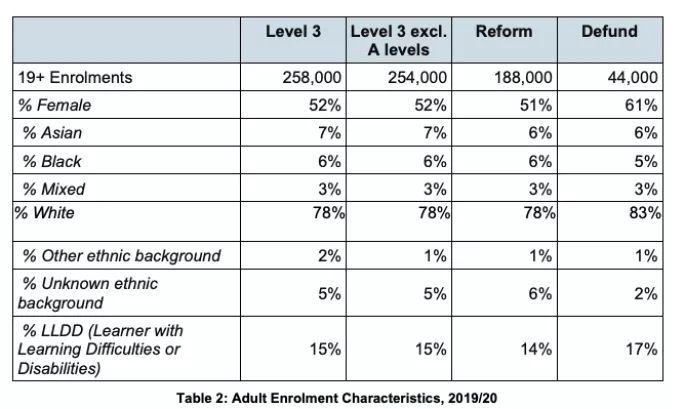
Some ‘won’t get level 3’ after qualifications reform

Some students may find it more difficult to achieve level 3 qualifications in the future as a result of the government’s reform programme, the Department for Education has said.
In the impact assessment published along with the response to the consultation on level 3 reform, the DfE said it is working to “ensure a high-quality route into employment is available at level 2” for “those students that are not able to access level 3 in future, even with additional support”.
It added: “We recognise that ensuring the qualifications offer at level 3 is consistently high-quality and leads to positive outcomes for all students who take them will inevitably mean that some students may find it more challenging to achieve level 3 in the future.
“This is why we will continue to work with providers to explore how we can best prepare students who may otherwise struggle to access A levels and other academic level 3 qualifications for academic study at level 3. This is in addition to the current T level transition programme, which already provides a year of preparatory content for students who want to progress to a T level.”
Btecs: DfE must rethink defunding plans, say leaders
More: DfE to finally announce level 3 reforms
Opinions: Why removing student options would be disastrous
The government has today confirmed that it wants students to take either T levels, A levels or an apprenticeship in post-16 education. It confirmed plans to defund any applied generals, like Btecs of Cambridge Nationals, which overlap with T levels.
Btecs and qualifications reform: The impact on students
The report adds that those with SEND, disadvantaged learners and male learners are “disproportionately likely to be affected”.
It says: “Following the additional flexibility on the future academic landscape, and the accompanying updated mapping and data, students from black ethnic groups are no longer anticipated to be disproportionately highly affected. However, those from white ethnic groups are now slightly more likely to be impacted.”

On adult learners, it says that previously it was thought that those from black and Asian ethnic groups, and female students, were likely to be particularly impacted by the proposals.
However, while the revised assessment still anticipated that female students could be particularly impacted by the reforms, the DfE no longer expected students from black and Asian ethnic groups to be particularly impacted by the reforms.
It adds: “However, we do expect that those from white ethnic groups could be more impacted, as well as those with learning difficulties or disabilities.”

Currently, there are around 200,000 students who take Btecs and other applied generals in FE institutions - and concern has been raised across the sector that defunding these qualifications would leave these students without clear progression routes.
In the impact assessment document published today, the DfE said students who will struggle to access the new high-quality level 3 qualifications may have better outcomes on a level 2, in comparison to “lower quality qualifications currently available at level 3”.
It added: “For those students that are not able to access level 3 in future, even with additional support, we are working to ensure that a high-quality route into employment is available at level 2.
“Our proposals will aim to better equip individuals for entry into the labour market and provide core transferable skills that people need to unlock successful careers or upskill later in life. It is expected that in many cases this will provide better outcomes than those provided by lower quality qualifications currently available at level 3. More detail will follow in the forthcoming consultation on level 2 and below.”
And while it said that other level 3 qualifications could be offered, they will have to meet a quality benchmark.
The effect on awarding organisations and providers
When it comes to the impact that the reforms will have on 16-19 enrolments in awarding organisations, the DfE report says that up to 10 awarding organisations (AOs), out of currently more than 130, could see their publicly funded 16 to 19 enrolments at level 3 and below fall by 80 per cent or more. Three of these AOs have over 500 Education and Skills Funding Agency-funded 16-19 enrolments at these levels.
It also suggests that up to five AOs could lose at least 80 per cent of their funded adult enrolments, none of which have over 300 ESF- funded adult enrolments. The combined impact shows that four AOs could lose at least 80 per cent of their funded enrolments, of which one has over 150 ESFA-funded enrolments. And on the impact on providers, the report says that 25 providers could potentially lose 75 per cent or more of their total funded enrolments. The vast majority of these are private-sector, publicly funded providers (23), with the others being a school and one other provider.
It adds: “It is important to note that all providers delivering non-A level, post-16 education will be impacted by the reforms. This is because qualifications that are expected to be available in future will still be subject to the new institute or Ofqual approval criteria, which will require changes in many cases in terms of content and assessment.”
Level 3 qualifications: the case for reform
Earlier today, the government announced it would “shake up” the post-16 education system to remove low-quality qualifications that lack job prospects. The new system will be phased in between 2023 and 2025.
Education secretary Gavin Williamson said: “As we recover from the pandemic, there can be no room in our education system for second-rate qualifications. Great qualifications are essential to helping everyone - no matter their age or background - to get good jobs and realise their ambitions.”
Association of Colleges chief executive David Hughes said the government should reconsider its plan to defund qualifications, and said more time was needed for the T levels to become established before any successful existing qualifications can be defunded.
“If the government really wants to level up, it needs to slow down this major reform and recognise the risks to thousands of young people. We are big supporters of T levels because they have the potential to improve the reputation and standing of technical education if they are implemented properly, alongside other qualifications. Colleges want to deliver them and employers are beginning to understand them and warm to them. Working with colleges, this reform would be a success, so it is difficult to see why the Department for Education is using a sledgehammer to crack a nut.
“We don’t need a strong-armed approach to force change, that change will happen. This approach risks leaving thousands of disadvantaged students with limited or no routes to progress into work or continuing education when they need them most.
Damaging prospects
Bill Watkin, chief executive of the Sixth Form Colleges Association, said: “The proposals set out today have the potential to be hugely damaging to the prospects and life chances of young people in England. It is clear that the government intends to sweep away the vast majority of applied general qualifications like Btecs, and students will only have the option to study A levels or T levels from the age of 16.
“But for many young people, studying a Btec qualification will be a much more effective route to higher education or skilled employment. Closing down this route means that thousands of students will be left without a viable pathway after they have finished their GCSEs - that’s bad for young people, bad for social mobility and bad for the economy. We’ll continue to work with the 10 education bodies in the #ProtectStudentChoice campaign to encourage the government to rethink these simplistic and regressive proposals.”
You need a Tes subscription to read this article
Subscribe now to read this article and get other subscriber-only content:
- Unlimited access to all Tes magazine content
- Exclusive subscriber-only stories
- Award-winning email newsletters
- Unlimited access to all Tes magazine content
- Exclusive subscriber-only stories
- Award-winning email newsletters
You need a subscription to read this article
Subscribe now to read this article and get other subscriber-only content, including:
- Unlimited access to all Tes magazine content
- Exclusive subscriber-only stories
- Award-winning email newsletters
- Unlimited access to all Tes magazine content
- Exclusive subscriber-only stories
- Award-winning email newsletters